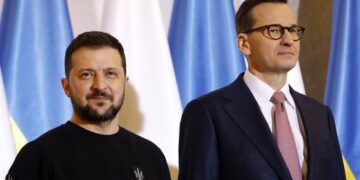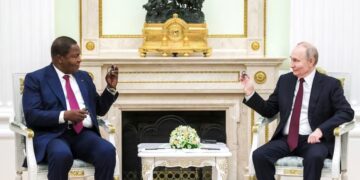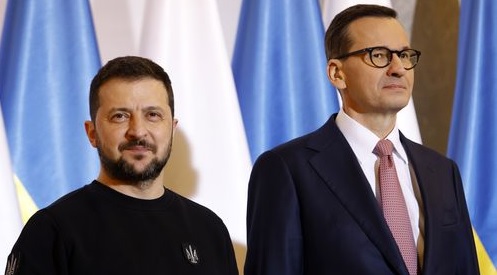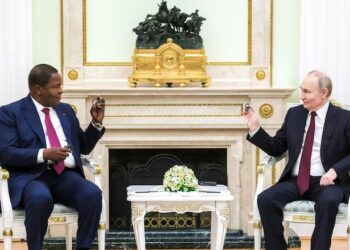By John Ikani
Poland, a staunch supporter of Ukraine, has decided to halt the supply of weapons to Ukraine amidst a growing diplomatic dispute linked to grain trade.
Polish Prime Minister, Mateusz Morawiecki made the announcement through a televised address on Wednesday.
According to Morawiecki, the nation’s focus will shift towards equipping itself with more contemporary weaponry.
The development comes as tensions between the two nations continue to escalate.
The catalyst for the decision was a statement made by President Volodymyr Zelensky of Ukraine at the UN, prompting Poland to summon Ukraine’s ambassador for discussions.
President Zelensky’s remarks included a reference to certain nations offering only superficial solidarity with Ukraine, a point that Poland strongly criticized, deeming it unwarranted, given their longstanding support for Ukraine since the initial days of the conflict.
The decision also came on the heels of rapidly increasing tensions between the two nations, driven by disagreements over grain imports.
The grain dispute traces back to Russia’s invasion of Ukraine, which effectively shut down the primary Black Sea shipping routes, forcing Ukraine to explore alternative overland transportation options.
Consequently, significant quantities of grain found their way into central Europe.
As a response to the influx of grain, the European Union temporarily imposed a ban on grain imports into five countries: Bulgaria, Hungary, Poland, Romania, and Slovakia.
The objective was to safeguard local farmers who were concerned that the influx of Ukrainian grain was driving down prices within their respective markets.
The ban, initially imposed, concluded on September 15, and the EU chose not to renew it.
However, Hungary, Slovakia, and Poland opted to continue enforcing the ban.
Ukraine responded by filing complaints with the World Trade Organization (WTO) against the three countries, asserting that their bans violated international obligations.
Ukraine’s Economy Minister, Yulia Svyrydenko, stressed that individual EU member states cannot unilaterally prohibit the import of Ukrainian goods.
Poland, despite the WTO complaints, affirmed their intention to maintain the ban and expressed their indifference towards the complaints lodged with the WTO.
It is noteworthy that despite the grain import ban, the three countries – Hungary, Slovakia, and Poland – have affirmed their willingness to allow the transit of grain through their territories to other markets.
The French Foreign Minister, Catherina Colonna, reacted to these developments by revealing that an EU study had determined that Ukrainian grain imports would not have a detrimental impact on European farmers.
She also expressed regret over the mounting tensions between the involved parties.




































